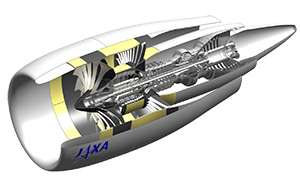Research & Development
JAXA promotes three research and development programs and a fundamental research program that underpins them.
Propulsion technology
-

- Low fuel consumption (low CO2) and environmental adaptability (low NOx and low noise) are strongly required world-wide for aero-engines. The most important issue for enhancing global competitiveness is the development of advanced technology to meet these demands and to establish Japanese superiority in the aviation industry in an early stage. Furthermore, state-of-the-art technology that eliminates fossil fuel usage while providing high-speed convenience and environmental compatibility is developed and demonstrated in an effort to explore new air transport infrastructure.
Combustion Stability Diagnostics by Utilizing Optical Measurements
Optical measurements, such as the OH-PLIF and OH* chemiluminescence imaging, were performed on a lean-burn combustor under combustion instabilities. Unsteady flame motions were successfully captured and used to detect the driving source of the combustion instability.
Renewable Energy Technology
Bio-jet fuels will be supplied to civil aircrafts in Japan in around 2020.
Combustion tests and engine tests have been performed to clarify the effect of the fuel change from petroleum fuel to bio-jet fuels on the emissions of the exhaust gas and the engine performance.
Aeroengine Structures & Materials Technology
The engine weight reduction technologies by applications of advanced structures and materials are developed to reduce fuel consumption or CO2 emissions of aircrafts.
Aeroengine Technology Demonstration
Aeroengine system is composed of many components forming a highly advanced system. Advanced component technologies developed through research projects are tested by installing in turbofan engines to step forward for the level of technological maturity adequate for practical use.
High Temperature Turbine Technology
Great improvement of efficiency is essential to environmentally friendly, lower fuel consumption aero-engines. More effective turbine cooling structures are studied to reduce cooling air as well as the development of conjugate numerical simulation technology for precise temperature estimation. Resistance of new superalloys and thermal barrier coatings and erosion / deposition behavior are evaluated under simulated thermal condition of jet-engine operation in much shorter time than actual usage.
Stabilizing cryogenic fuel systems
By utilizing cryogenic propellant testing facilities and testing technology, JAXA is working to establish a cryogenic fuel supply system that can also be applied for general use in society on a broad scale.
Aeroengine noise reduction technology
Aeroengines have different types of sound sources. Thus, activities toward noise reduction involve investigating the acoustic properties of the sound sources and of aeroengines and developing the noise reduction technologies balanced with engine performances like fuel consumption, thrust, and weight.
March 31, 2020